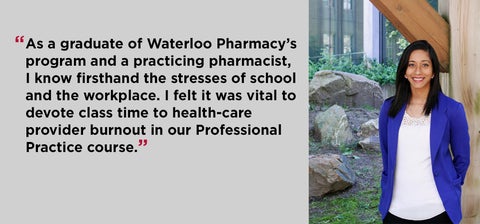
Taking a moment to check-in: Pharmacy team delivers assignment to help students manage burnout
Professional burnout is a serious risk in health-care. This fact is on full display during a global pandemic that has raged for nearly a year. Health-care providers’ (HCP) daily work demands great care, constant engagement with others and meticulous problem-solving. When HCP burnout occurs, patient health or satisfaction often suffers.
Pharmacists are not immune to burnout. To help students identify the signs of burnout and to support their own mental health in a taxing educational program, a team of Waterloo Pharmacy faculty and staff developed and delivered an assignment on burnout and wellbeing in 2019.
“As a graduate of Waterloo Pharmacy’s program and a practicing pharmacist, I know firsthand the stresses of school and the workplace,” says Heidi Fernandes, lead author on the study. “Although we were just two years into practice, my classmates and I noticed that we were already experiencing varying degrees of burnout. It didn't matter what our practice environment was – any pharmacist could be susceptible to this occupational phenomenon. Knowing this, I felt it was vital to devote class time to health-care provider burnout in our Professional Practice course.”
The assignment involved pre-readings on burnout and the risks it poses in health-care. Students were then asked to complete an assessment of their own mental health, ranking their wellness on a 10-point scale and reflecting on questions about where and how they spend their energy.
After their self-assessment, students were invited to make a one-on-one appointment with faculty and staff members at the School. Participating staff ranged from the course instructors to other professors to academic advisors. During fifteen-minute appointments, students discussed their self-assessment and were offered a variety of strategies for self-care and additional resources to explore. The assignment had no marks associated with it, but even still 76 of the course’s 120 students opted to complete the one-on-one check-ins.

Photo: Heidi Fernandes. Fernandes, along with the following people, were facilitators for the check-in appointments: Robin Andrade, Kaitlin Bynkoski, Becky Ewan, Tom McFarlane and Cynthia Richard.
“The overwhelming feedback from students and faculty and staff participants was positive,” says Fernandes, who is now a PhD candidate at the University of Alberta. “Students very much valued the one-on-one discussions and appreciated that we scheduled this small break at a busy time of term.”
By scheduling the assignment during a stressful time, the assignment helped model the value pausing to reflect and check-in in the midst of a busy, demanding schedule. Fernandes surveyed students on their experiences of the assignment afterwards and found that the main criticism was that the students wished that their one-on-one appointments were longer than fifteen minutes.
Based on survey feedback, Fernandes and her collaborators published a paper on the assignment in the journal Pharmacy. They also intend to survey participants in the future to assess the long-term effects, research which is supported by a LITE grant from the Centre for Teaching Excellence.
“Looking back, I realized the Check-in appointments were held the same day WHO officially declared COVID-19 a pandemic,” Fernandes says. “It’s serendipitous that we held activity of this nature on the same day that changed everything as we knew it. It was perfect timing to focus on our mental health as the year immediately following the Check-in would test our mental health of everyone - not just healthcare providers.”